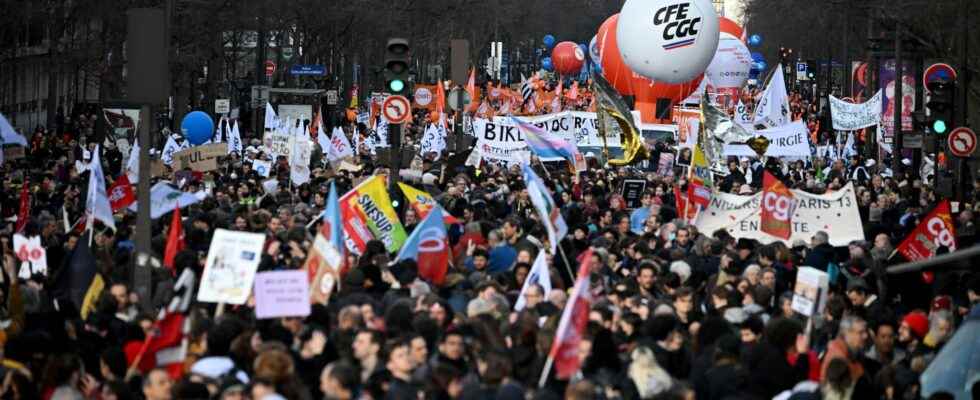The objective of the unions has been clear and known for several weeks: to put France “on hold” on Tuesday March 7. For the big day of mobilization against the pension reform, the inter-union is counting on massive and even renewable strike movements in all sectors.
SNCF and RATP warned on Sunday March 5 that public transport traffic would be very disrupted on Tuesday, inviting users to postpone their trips. The declines in production also continue in the electricity sector, the movement of which began on Friday. Update on the main mobilizations expected.
Transport: train traffic “very seriously disrupted”
The circulation of trains in France will be “very strongly disturbed” on Tuesday, for the TGV as for the TER, and “very disturbed” in the metro and the RER in Ile-de-France, announced Sunday the SNCF and the RATP.
Only one train in five will run for the TGV Inoui and Ouigo as well as for the TER, and two trains out of three on average on the international Thalys and Eurostar connections. Traffic will be almost completely at a standstill on the Intercités and many disruptions are to be expected on the Transiliens, with between one train in three and one in ten depending on the line.
On the Paris metro side, most lines will see their traffic restricted mainly at peak times, with the exception of lines 1, 14 and 4. The RER will have between one train in two and one train in three on the RATP side and between one in three and one in five on the SNCF side.
In the air, the Direction Générale de l’Aviation Civile (DGAC) has asked companies to reduce their flight schedules on Tuesday March 7 and Wednesday March 8, by 20% at Paris-Charles-de-Gaulle and by 30% at Paris-Orly, Beauvais, Bordeaux, Lille, Lyon, Nantes, Marseille, Montpellier, Nice and Toulouse. “Air France plans to operate nearly 8 out of 10 flights, including all of its long-haul flights,” the company said, “however, last-minute delays and cancellations cannot be ruled out.”
The truckers also intend to join the movement, certain unions like Force Ouvrière-UNCP having called to mobilize on Sunday evening, with blockages of logistics platforms, industrial zones and snail operations around the large metropolises started this Monday morning.
Industry and energy: pickets already installed
In energy, the movement started on Friday March 4 afternoon at the call of the CGT, due to the opening of the debate on Saturday March 5 in the Senate on article 1 of the text, on the suppression of special pension schemes, including that of energy companies. Sunday, shortly after 4 p.m., production cuts reached more than 5,000 megawatts on nuclear, hydroelectric and thermal power plants, the equivalent of five nuclear reactors. Strike pickets have also started to be installed.
The movement “aims to expand”, “at least until the 7th and at the most until winning”, warned Sébastien Ménesplier, secretary general of the CGT Energy, on Saturday. He promised “a dark week in energy”, with targeted cuts, blockages, occupations, and always “Robin Hood operations” aimed at the population (such as the cutting of road radars).
In the refineries, the CGT also called for a renewable strike, with the aim of “blocking the entire economy”, at the level of the production, distribution and importation of fuel, according to the CGT- Chemistry. Initially, the strikers intend to block shipments from refineries to depots, but if the movement were to last three days or more, it could lead to the shutdown of refineries. That of Donges (Loire-Atlantique), one of the most important of TotalEnergies, is already “out of production” due to an electrical problem which occurred on February 27, according to management.
Another link, the refuellers or “sky pumpers”, responsible for supplying the planes, are also called to strike in airports throughout France. The CGT, the leading union in the sector, expects an “immediate” impact. The entire oil and chemical sector is called upon to strike, including in the pharmaceutical sector.
New in the industry, the call to strike in the whole of the metallurgy and in particular among the giants of the sector: aeronautics, automobile and steel are all concerned by a strike that the branch union hopes to see renewed. The CGT unions of Thales, Valeo, Stellantis, ArcelorMittal, Forvia, Airbus, Safran and Renault have notably called for action. The various metalworking industries employ some 1.5 million workers. In the agri-food sector, the CGT is calling on the big French sugar producers to shut down from Tuesday.
Education: disruptions that promise to be strong
The Snuipp-FSU, the first union of the first degree, will not give its strike forecasts for nursery and elementary schools before Monday. Conversely, no figures expected for colleges and high schools, secondary school teachers not being required to declare themselves strikers 48 hours before. However, the disturbances in all the establishments are expected to be strong. The seven main teacher unions have indeed called for “total closure of schools, colleges, high schools and services” on March 7.
Sporadic blockages by high school students are also expected. Ditto in the faculties, where mobilization is struggling to take off. Student and high school organizations have called for “hardening the movement” against the reform with a day of youth mobilization scheduled for Thursday, March 9.
